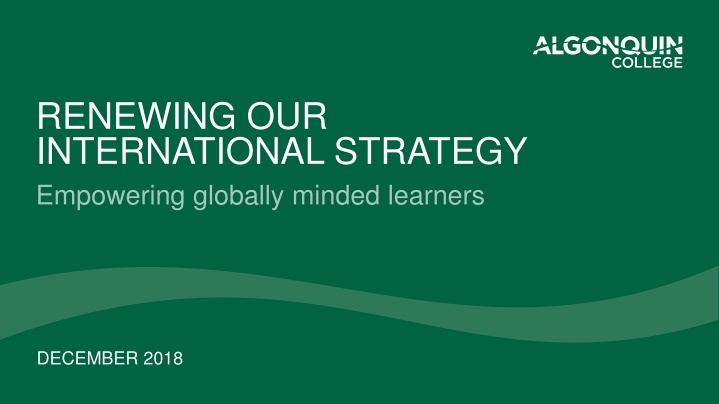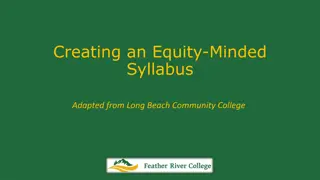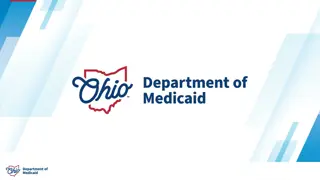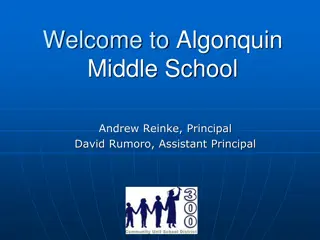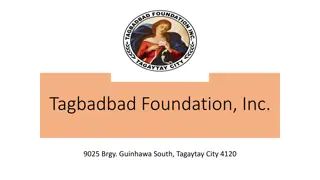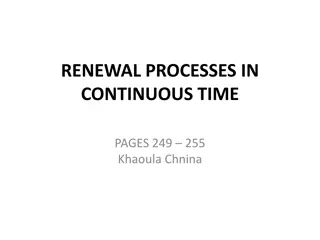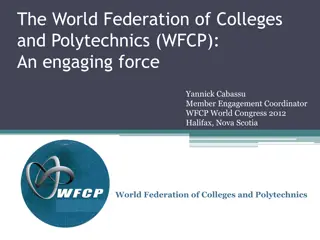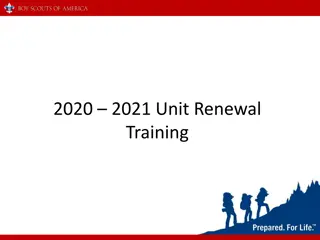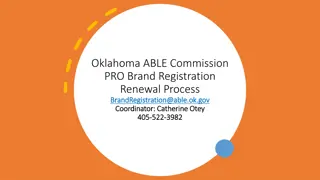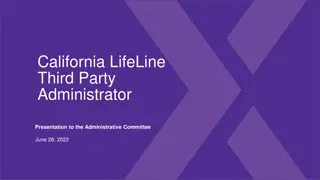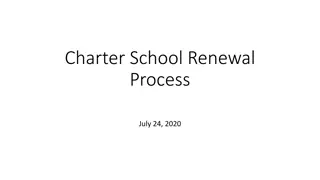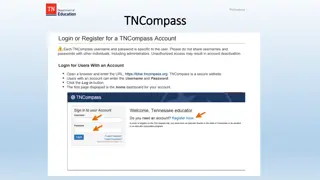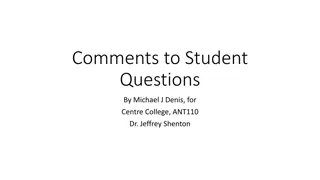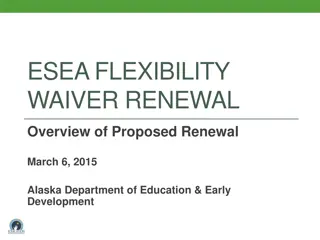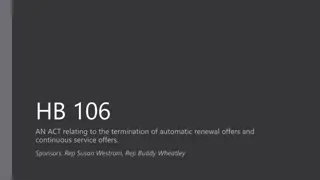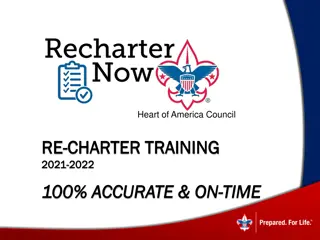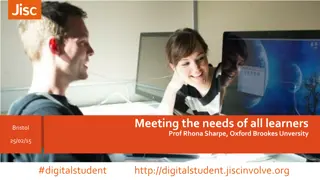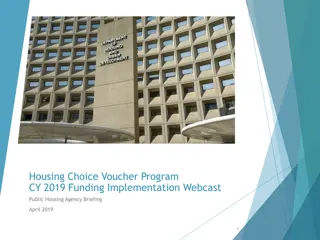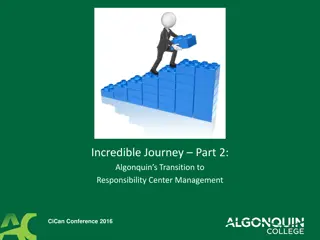Empowering Globally Minded Learners: Algonquin College's International Strategy Renewal
Algonquin College's international strategy renewal in December 2018 focuses on empowering globally minded learners. The update reflects new opportunities and expectations in the global context, emphasizing learner-driven quality, innovation, and sustainability. It aligns with Ontario's goals for international postsecondary education, aiming to create global citizens, contribute to communities and the economy, and strive for sustainability. The strategic update was directed by the College's Board of Governors, aligned with its overall strategic plan and other initiatives, following a consultative process with the College community.
Download Presentation

Please find below an Image/Link to download the presentation.
The content on the website is provided AS IS for your information and personal use only. It may not be sold, licensed, or shared on other websites without obtaining consent from the author.If you encounter any issues during the download, it is possible that the publisher has removed the file from their server.
You are allowed to download the files provided on this website for personal or commercial use, subject to the condition that they are used lawfully. All files are the property of their respective owners.
The content on the website is provided AS IS for your information and personal use only. It may not be sold, licensed, or shared on other websites without obtaining consent from the author.
E N D
Presentation Transcript
RENEWING OUR INTERNATIONAL STRATEGY Empowering globally minded learners DECEMBER 2018
WHY THIS REFRESH? International education engages every part of Algonquin College and touches on nearly every goal in its 2017 2022 Strategic Plan to: International postsecondary education used to be a nice to have but today it is a social and economic imperative. This update to Algonquin College s 2014 international strategy reflects new opportunities, new realities and new expectations of international postsecondary education in a truly global context. be learner- driven lead in quality and innovation be sustainable provide an exceptional place to work 2
A PROVINCIAL CALL TO ACTION What is a global citizen ? The prerequisite for global citizenship is knowledge knowledge about the ties that bind us in domestic and global communities and the forces that rend us asunder; knowledge about the uses and misuses of power, and the beneficent and unfortunate consequences of public policy; and knowledge about peoples and cultures at distant removes from ourselves with whose lives we are nevertheless interlinked. In 2018, the Government of Ontario set some clear goals for international postsecondary education: 1.Create global citizens 2.Contribute to Ontario s communities and economy 3.Strive for sustainability Haverford College Center for Peace and Global Citizenship 3
SUPPORTING OTHER COLLEGE STRATEGIES Our international strategy aligns with the College s overall 2017 2022 Strategic Plan and other strategic initiatives, including our: People Plan Learner-driven Plan Indigenous Plan Innovation and Entrepreneurship Plan Applied Research and Innovation Plan 4
DIRECTED BY OUR BOARD OF GOVERNORS The College s Board of Governors urged for this strategic update to: Be clear about the College s reasons for pursuing international education Align with the full capabilities of the College, not just its International Education Centre Be based on data about the College s own experience with international education, knowledge of best practices and awareness of competitors Consider a broad range of possibilities and potential students 5
A CONSULTATIVE PROCESS To reflect the needs of the College community, we consulted: The Strategic Enrolment Management Committee Algonquin College Leadership Team (information only with feedback requested) Waterfront Campus Open Session Academic Council Chairs Council Woodroffe Campus Open Session Innovation and Strategy (Area 4) Open Session Ontario Association for International Education (feedback from other colleges and universities) We re passionate about this. We want other people to be excited about it, too. International belongs to everyone. International Strategy Committee Advisory Committee member ...and collected feedback through our website. 6
THE GOAL WE HAVE SETTLED ON To empower globally minded learners with the skills and experience to build sustainable, diverse communities.
HOW WE ARRIVED AT OUR GOAL PART 1: UNDERSTANDING THE GLOBAL CONTEXT 8
CANADA IS A TOP DESTINATION FOR GLOBAL LEARNERS 4th most popular choice for international students in the world up from 7th in 2015 11% of postsecondary students in Canada were international in 2015-2016 (Source: Statistics Canada) 9
FEW CANADIAN STUDENTS ARE GETTING INTERNATIONAL EXPERIENCE Just 2.3%of Canadian university students study abroad compared to 30% of German and 50% of Australian students The biggest barrier cited is financial 10
TRANSNATIONAL EDUCATION IS GROWING Transnational refers to the mobility of higher-education programs and institutions / providers across international borders Has doubled since 2000 and continues to grow https://www.eaie.org/blog/key-elements-transnational- education-tne.html 11
HOW WE ARRIVED AT OUR GOAL PART 2: ASSESSING INTERNATIONAL AT ALGONQUIN COLLEGE TODAY 12
WE DELIVER IT TWO WAYS Onshore ESL/EAP PSE Contract Training Exchanges Offshore Campuses and Partnerships Licensed PSE Program Contract Training Exchanges 13
ONSHORE ENROLMENT KEEPS CLIMBING By 2022, 25% of total student population of 42,012 will be international 10664 9695 In 2018 19, 18% of total student population is international 8813 Green = actual Blue = pro forma 8012 5618 In 2012 13, 5.8% of total student population was international 4014 3183 2740 2264 1975 12/13 13/14 14/15 15/16 16/17 17/18 18/19 19/20 20/21 21/22 14
INDIA HAS OUTPACED CHINA AS OUR TOP SOURCE COUNTRY 3000 2500 2000 2013-14 2014-15 2015-16 2016-17 2017-18 2018-19 1500 1000 500 0 INDIA CHINA SAUDI ARABIA VIET NAM KOREA, SOUTH BRAZIL 15
67% OF OUR INTERNATIONAL ENROLMENTS ARE IN 3 SCHOOLS 5% ACCE 12% Arts, Media & Design 10% ACCE Advanced Tech Business Hospitality Arts, Media & Design Health, Public Safety IEC CCOL Heritage Ottawa Valley Hospitality 16% Advanced Tech 30% Business 25% 16
INTERNATIONAL STUDENTS ARE HAPPY WITH OUR COLLEGE 85% of international students said they were satisfied or very satisfied with their experience at Algonquin College overall. 2014 2015 2016 2017 Arrival satisfaction 91 93 93 90 Learning overall 91 89 90 78 Living overall 90 92 91 89 International Education Centre 93 91 91 89 International Student Barometer, Fall 2017 International student activities 95 96 96 95 Support overall 92 91 91 91 Willingness to recommend 45 48 53 45 * We believe the score was impacted by the 5-week labour disruption ** For Willingness to Recommend, question asked, Would you actively encourage people to apply? 17
HOW WE ARRIVED AT OUR GOAL PART 3: DEFINING OUR CURRENT STATE 18
PLAYING TO WIN: OUR STRATEGIC FRAMEWORK The purpose of the enterprise: Our guiding aspirations What is our winning aspiration? The right playing field: Where we will compete: our geographies, product categories, consumer segments, channels, vertical stages of production Where will we play? The unique right to win: Our value proposition Our competitive advantage How will we win in chosen markets? The set of capabilities required to win: Our reinforcing activities Our specific configuration What capabilities must we have? The support systems: Systems, structures, and measures required to support our choices What management systems do we need? 19
CURRENT STATE STRATEGY CASCADE Our goals, as defined in the 2014 International Education Strategic Plan: To serve as a catalyst for community social and economic prosperity through the development of human talent and applied research To improve College sustainability by embracing innovation, increasing quality, and generating contributions for re-investment in the College To support student and employee employability by providing relevant and rewarding global experiences Our winning aspirations 20
CURRENT STATE STRATEGY CASCADE To achieve our aspirations, we focus on: Onshore and offshore products and partnerships Onshore: PSE programs, English as a Second Language, Exchanges Primarily India and China with offices in both countries, Vietnam as a result of changes in Canadian visa processes Offshore: Campuses and Partnerships, Licensed PSE Programs, Corporate Training and Development Assistance Primarily Mexico, Kuwait, China, India, Brazil, South Korea, Montenegro, Kenya & the Caribbean (through CICan) Where we play 21
CURRENT STATE STRATEGY CASCADE To achieve our aspirations, we succeed as a result of: 1. Location: Canada (with proximity to Toronto and Montreal) 2. Programs of study 3. Service delivered by International Education Centre and the Language Institute 4. Easy to work with Online environment (for agents through our admissions portal, for students through our CRM-backed online services) Strengthened student preparedness and support processes How we win 22
CURRENT STATE STRATEGY CASCADE To achieve our aspirations, we have invested in: The International Education Centre comprised of three units Recruitment, Business Development, Student Services and the Language Institute Digital Strategy team that continuously improves our client facing technology Direct and indirect marketing capabilities Product development and quality assurance services Framework for a franchise model The capabilities we have 23
CURRENT STATE STRATEGY CASCADE The following systems and mechanisms help us achieve our goals: Use of Annual Student Barometer Survey Use of Net Promoter Score (Willingness to Recommend) to track daily client satisfaction Adoption of lean management Use of customer relationship management tools and software The management systems we have 24
HOW WE ARRIVED AT OUR GOAL PART 4: SHAPING OUR STRATEGY 25
THE STRATEGY DEVELOPMENT PROCESS Option 1 Option 2 Opportunity Option 3 Option 4 What would have to be true? Option 5 Decide Tests Barriers 26
OPTIONS WE CONSIDERED 1. Focus primarily onshore Grow international student population (to 15%, 20%, 30%, 40%?) 2. Focus on both onshore and offshore In all markets or select markets or markets aligned with program excellence? Endorsing an offshore franchising model (requires brand risk assessment) 3. Focus on transnational education opportunities Grow offshore partnerships, branch campuses, franchises (e.g., increasing international development projects) 4. Focus on mobility (sending students and faculty abroad) Grow study and work abroad (to 2.5%, 5%, 10%, 20%?) 5. Focus on profitable lines of business only Onshore, offshore or both (e.g., short-term programming, training of faculty and staff from other institutions) 27
DEFINING OUR CURRENT STATE The Playing to Win framework asks us to imagine the future by identifying the problem we re trying to solve. This was what we articulated: How do we embed internationalization into Algonquin College s culture and processes? 28
SOLVING THE PROBLEM HAS IMPLICATIONS FOR... Our business model Culture Risk appetite Resources and capacity Processes and procedures Approach to mobility and internationalization 29
WHAT WOULD HAVE TO BE TRUE TO SOLVE THE PROBLEM? Consideration What would have to be true? We may need to evolve our business model by: Diversifying revenue contributions to establish international enrolment caps (by country or program) Shifting to year-round program delivery Developing a model for micro credentialing Developing better internal pathways between programs and between credentials (more of a laddered system) Streamlining financial and approval processes within the College Encouraging the use of both qualitative and quantitative measures to track success and effectiveness of international activity Business model 30
WHAT WOULD HAVE TO BE TRUE TO SOLVE THE PROBLEM? Consideration What would have to be true? Across the College, supporting international education requires organizational commitment to: Making the necessary system changes (upgrade technology) Improving the agility of the College (around policies and procedures change, technology, staffing) to respond to increased enrolment Delivering an individualized international learner experience Embedding consideration of international learner experience in all areas of the College such as ensuring every student-facing role has a minimum level of cultural awareness Developing characteristics of Global Citizenship in all learners and across the College Across the College, supporting international education requires organizational commitment to: Determining our risk threshold in each line of business Following robust mechanisms for risk mitigation Weighing reputational risk needs with financial risk Creating a robust mechanism to monitor and respond to safety and security situations abroad in real-time and a system of communication with students and staff abroad Culture Risk appetite 31
WHAT WOULD HAVE TO BE TRUE TO SOLVE THE PROBLEM? Consideration What would have to be true? To support international students and potentially broaden international offerings, the College must: Have sufficient space Be able to adequately provide services to support a diverse student population (including residence and meals) & have the capacity (staff and faculty) to support international student needs Align resources between recruitment and admissions/services Be mindful of financial realities and corridor funding model Ensure systems are in place that allow IEC to effectively mobilize technical and academic expertise within the College community for transnational education activities Resources and capacity 32
WHAT WOULD HAVE TO BE TRUE TO SOLVE THE PROBLEM? Consideration What would have to be true? Internally, supporting international education requires: A more efficient process for curriculum review and adherence to official curricular templates College-wide Expedited reviews of articulation agreements and pathways by pathways department Develop a more streamlined process for assessment of advanced standing Support from all department and schools and greater integration of IEC with other areas Processes and procedures 33
WHAT WOULD HAVE TO BE TRUE TO SOLVE THE PROBLEM? Consideration What would have to be true? With respect to mobility, international education requires: Senior management support for funding Flexible electives and credit transfer policies that facilitate study abroad Mentoring and orientation for faculty to impart best practices for teaching abroad Creating a robust mechanism to monitor and respond to safety and security situations abroad in real-time and a system of communication with students and staff abroad and policies to guide associated program/activity postponement or cancellation Focusing on learner experience, including 'international at home' initiatives for local students Approach to mobility and international- ization 34
THE STRATEGY IN DETAIL To empower globally minded learners with the skills and experience to build sustainable, diverse communities. What is our winning aspiration? Goals: Exceptional personalized, digitally-connected, experiential experience Sustainable growth Global citizenship 36
THE STRATEGY IN DETAIL To achieve our aspiration, we will focus on: Onshore and Offshore international education in emerging markets aligned with the Canadian government s international direction. Onshore: PSE programs, English as a Second Language, Exchanges In an increasingly broader mix of countries, spread across all three Canadian campus Offshore: Campuses and Partnerships, Licensed PSE Programs, with an increased focus on Corporate & Contract Training In an increasingly broader mix of countries, through regional offices in Asia, Europe, South America and Africa Where will we play? Aligned with the College s Academic and Research strengths. With a focus on mobility welcoming international students at all three domestic campuses and increasing the percentage of learners and employees who go abroad. 37
THE STRATEGY IN DETAIL To achieve our aspiration, the College will be renowned for our: 1. Innovative and entrepreneurial Canadian approach to post-secondary education 2. Exceptional Cross-college international learner experience Use of digital technologies and pedagogy Breadth of international Co-op, study and work abroad opportunities Experience supporting indigenous and under-represented communities 3. Centres of Academic and Research Excellence with a global perspective 4. Partnership approach that delivers rapid results for all parties 5. Diversity of our employees How will we win? 38
THE STRATEGY IN DETAIL Mindset & Culture Innovation and entrepreneurial mindset that includes; Cross-college appreciation for the value of diversity and global perspectives Openness to change, agility What capabilities must we have? Academic Alignment Mentoring, orientation, and on-going training for faculty, Program Coordinators, Chairs and Deans, including; Someone to call when looking for help Cultural awareness Pedagogy and data that advances learning Capacity to support the rapid expansion of international partnerships, curriculum, and pathways Ability to predict program space (seats) for international students over multiple years Capacity to mobilize technical and academic expertise within the College community for business development (offshore/transnational education) activities 39
THE STRATEGY IN DETAIL Cross-College Support System Mentoring, orientation, and on-going training for Support Staff and Administrators Someone to call when looking for help Cultural awareness Data that identifies international challenges and opportunities Shift from siloed support for international students to the internationalization of all College services and departments (admissions, counselling, social events, athletics, food, student housing, etc.) Arrival and Departure Services that exceed expectations Internationalized technology platform with capacity to scale What capabilities must we have? (cont d) Partnership/Business Development & Product Development Integration of college business development efforts Partnership offices in emerging markets Co-op, work and study opportunities for both learners and employees International communication, marketing and external relations skills Product development and management 40
THE STRATEGY IN DETAIL The following systems and mechanisms will help us achieve our goals: What management systems do we need? Leadership Strategic Enrollment Plan and reporting that clarifies international targets and activities Board of Governors review of the College s offshore franchising model, including its risk management framework Creation of a Chair s position to support Academic work Establishment of an Algonquin College International Advisory Committee International Annual Report, which includes reporting on best practices piloted at Algonquin and across the world 41
THE STRATEGY IN DETAIL Policies and Procedures Improvement in policies and processes that; Guide associated program/activity postponement or cancellation Advance prior learning assessment and permit advanced standing Quantify international demand for programs of study, in support of quality assurance work and new program development Internationalized curriculum and College-wide adherence to official curricular templates Expedite articulation agreements, pathways, and institutional partnerships Flexible electives and credit transfer policies that facilitate study abroad, with a focus on the learner experience (and including international at home initiatives for local students) Adoption of The AC Way, Algonquin s unique adoption of lean management What management systems do we need? (cont d) 42
THE STRATEGY IN DETAIL Data, Business Intelligence and Technology Systems Use of Net Promoter Score (Willingness to Recommend) to track daily client satisfaction International Department participation on the College s Data Governance Committee Consistent use of the College s enterprise resource planning systems Learning Management System (Brightspace) Customer Relationship Management system (Salesforce) Financial and Human Resources system (Workday) What management systems do we need? (cont d) Risk Management Mechanisms for monitoring and responding to safety and security situations abroad in real time, including a system for communicating with students and staff Robust, but not complex, mechanisms for risk mitigation 43
HOW WILL WE KNOW WEVE SUCCEEDED? By 2022, this plan will see us achieve the following goals and measures: Exceptional personalized, digitally-connected, experiential experience International students willingness to recommend Algonquin College moves from 45% to 57%, as measured by the International Student Barometer International Student Central Net Promoter score maintained in the +60 to +70% International co-op opportunities grows from X to Y 44
HOW WILL WE KNOW WEVE SUCCEEDED? Sustainable growth Grow onshore enrolment in post-secondary programs of study from 18% to 25% Adjust the international net contribution in the following manner: Net contribution before revenue sharing from $24.2M to $47.5M Net contribution from offshore/transnational education from $458K to $1.1M International revenue sharing model updated to include both academic and other impacted areas Employees willingness to recommend the international support and training available to them Global citizens The number of domestic students who participate in a College-sanctioned international experience from 0.55% to 3.5% The number of employees who participate in a College-sanctioned international experience from 0.1% to 2% 45
WHAT ARE SOME POTENTIAL BARRIERS? Limited ability to respond to fluctuations in international interest and applications Lack of strategic international enrolment customized by program and source country Domestic-focused program review processes Siloed net contribution model, which means some divisions may post losses on supporting international activities that actually represent overall gains for the College Inconsistent embrace across the College of the importance of developing all learners as global citizens Competing departmental business plans that divide resources and limit synergies 46
WHAT CAN WE TEST? We need to confirm that with implementation we will have: Accurate forecasting: Embedding international applicant demand in initial scoping for new programs through a systematic, thoughtful approach using realistic pro forma projections at the program level, based on trends and labour market needs. Forecasting should also confirm our collective commitment to continuous improvement/agility to respond to increased enrolment and sudden, unforeseen fluctuations. Support for mobility: Making this a goal of senior management, with additional resource and policy support enabled by more flexible electives and credit transfers. 47
WHAT CAN WE TEST? Sufficient capacity: Triggering program reviews if international enrolment in a given program exceeds a set threshold, which will enable considered decisions about the appropriate percentage of international students in any particular program and levels of resourcing for support. Overall, international enrolment may need to be capped to avoid overwhelming College resources. Financial sustainability: Confirming the College is not dependent on unlimited/unending international enrolment growth. Sustainability also depends on diversifying international revenue sources through strategic business development. Appropriate risk management: Endorsing further franchising (e.g., the Algonquin College Kuwait model) and offshore program licensing, conditional upon appropriate risk assessment. Institutional support: Embracing a College-wide net contribution model, sufficient space availability support from academic areas and academic development. 48
Appendices 49
CONSULTATION TIMELINE College community consultations May Oct 2018 Board of Governors presentation April 2019 ACET presentation December 2018 Resumption March 2018 Startup Fall 2017 50
